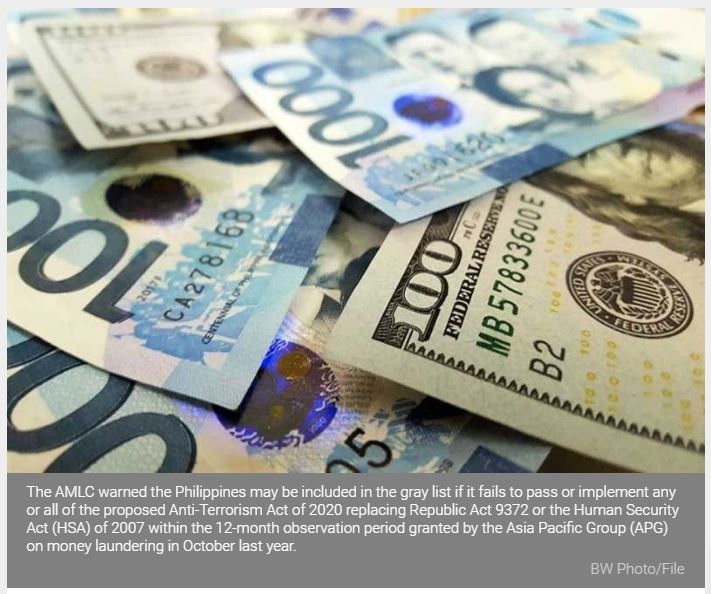AMLC: Philippines faces sanctions if terror bill not passed
MANILA, Philippines — The Philippines faces possible sanctions from Paris-based anti-money laundering watchdog Financial Action Task Force (FATF) if it fails to pass key laws, including the controversial anti-terrorism bill, according to the Anti-Money Laundering Council (AMLC).
The AMLC warned the Philippines may be included in the gray list if it fails to pass or implement any or all of the proposed Anti-Terrorism Act of 2020 replacing Republic Act 9372 or the Human Security Act (HSA) of 2007 within the 12-month observation period granted by the Asia Pacific Group (APG) on money laundering in October last year.
“This observation period is the last opportunity for competent Philippine authorities to address identified deficiencies in the mutual evaluation report to avoid gray-listing. Among these deficiencies are the gaps in the HSA and the Anti-Money Laundering Act of 2001, as amended,” AMLC said.
The STAR earlier reported that the country’s observation period has been extended to February next year due to the coronavirus pandemic and the AMLC is required to submit a comprehensive report on the progress in implementing the recommended actions after a review in April.
The FATF will decide in June 2021 instead of February 2021 whether or not the Philippines will be included in the watchdog’s gray list.
AMLC said that passing amendments to both the HSA and AMLA is among the conditions to avoid the country’s inclusion in the gray list.
The proposed anti-terrorism bill that has been forwarded to Malacañang, after being approved by Congress, is expected to strengthen the country’s counter-terrorism policies.
AMLC said the Philippines should also be able to demonstrate effective implementation of the proposed amendments before the observation ends in February as it is being assessed both on technical and effective compliance.
It said fighting terrorism is just as urgent as protecting life as the coronavirus disease 2019 or COVID-19 pandemic has taught authorities about the importance of being prepared.
“Just as we don’t know when pandemics will hit, so too when terrorist acts will occur and take away life,” it said.
Inclusion in the gray list would publicly identify the Philippines as a risk to the international financial system for having strategic deficiencies in the anti-money laundering/counter-terrorism financing (AML/CTF) framework. It would result in an additional layer of scrutiny from regulators and financial institutions resulting in higher cost of doing business, delay in processing, and worst block the country’s quest for an A credit rating from debt watchers.
“The pandemic is already adversely affecting our economy. It would be prudent to mitigate other risks and avoid problems gray-listing would further bring to our economy,” it added.
The Philippines was blacklisted by the FATF in 2000 for failing to address “dirty” money issues. This paved the way for the enactment of Republic Act 9160 or AMLA in 2001.
The country was subsequently removed from the blacklist in February 2005. It narrowly avoided being placed on blacklist in 2012 as it criminalized terrorist financing and pursued quicker freezing of suspect accounts.
AMLC said the current HSA does not comply with the several United Nations Security Council Resolutions (UNSCR) aimed at stopping the increase of foreign terrorist fighters including the expansion of their requirement and their material support other than financing.
It added the FATF saw these inadequacies during the mutual evaluation last year prompting the watchdog to push amendments to the HSA including the designation of ex parte of terrorist individuals, terrorist associations or group of persons as well as implementation of targeted financial sanctions to stop the flow of funds or assets to terrorists; and to stop the use of such funds or assets, pursuant to UNSCR 1373.
FATF also pushed evidentiary standards of “probable cause” when making designations and criminality provisions for foreign terrorist fighters and the financing of the travel of terrorists.
“These proposed amendments have since been incorporated in the anti-terrorism bill,” AMLC said.
The proposed bill, AMLC said, clearly defines terrorists as those who engages in acts intended to cause death or serious bodily injury to any person, or endangers a person’s life; acts intended to cause extensive damage or destruction to government or public facilities, public places, or private properties; acts intended to cause extensive interference with, damage, or destruction to critical infrastructures; develops, manufactures, possesses, acquires, transports, supplies, or uses weapons, explosives, or biological, nuclear, radiological, or chemical weapons; and releases dangerous substances or causes fires, floods or explosions.
AMLC clarified terrorism does not include advocacy, protest, dissent, stoppage of work, industrial or mass action, and other similar exercises of civil and political rights, which are not intended to cause death or serious physical harm to a person, to endanger a person’s life, or to create a serious risk to public safety.
Source: https://www.philstar.com/business/2020/06/15/2020873/amlc-philippines-faces-sanctions-if-terror-bill-not-passed


 Thailand
Thailand




